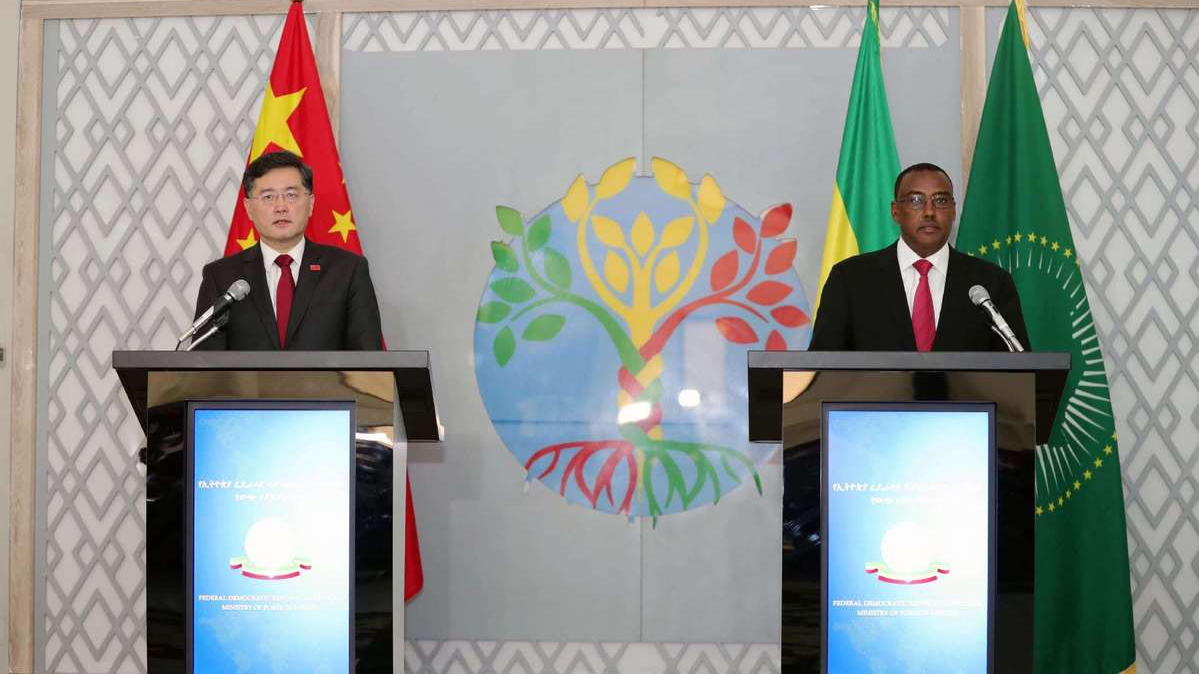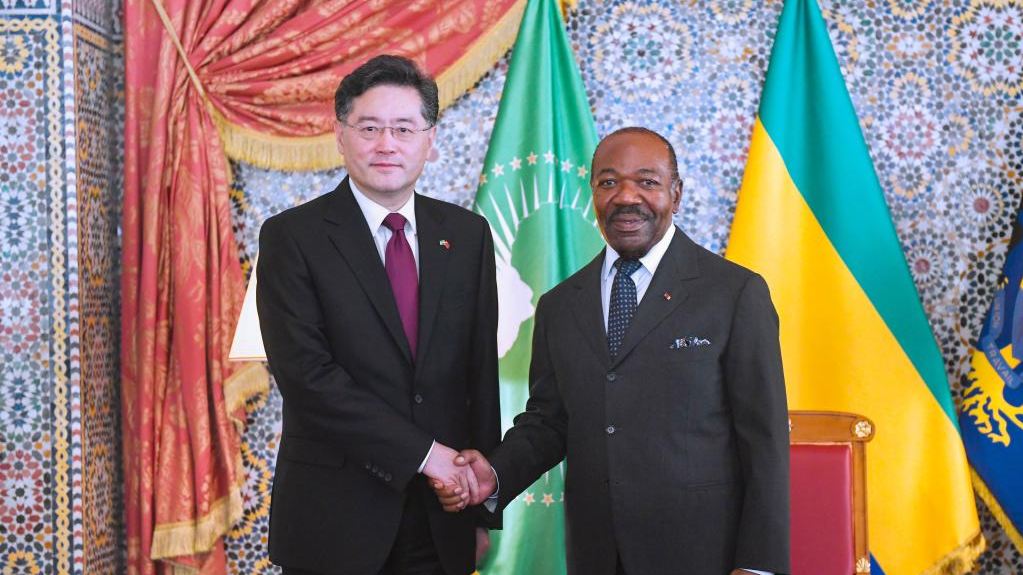
Chinese Foreign Minister Qin Gang (L) and Ethiopian Deputy Prime Minister and Foreign Minister Demeke Mekonnen attend a press conference after their talks in Addis Ababa, Ethiopia, January 10, 2023. /Xinhua
Chinese Foreign Minister Qin Gang (L) and Ethiopian Deputy Prime Minister and Foreign Minister Demeke Mekonnen attend a press conference after their talks in Addis Ababa, Ethiopia, January 10, 2023. /Xinhua
Editor's note: Stephen Ndegwa is a PhD student in International Relations at the United States International University-Africa, and the Executive Director of South-South Dialogues, a Nairobi-based communications development think tank. The article reflects the author's opinions and not necessarily those of CGTN.
The recently appointed Chinese Foreign Minister Qin Gang is on a five-nation Africa tour, including a visit to both the African Union Headquarters and League of Arab States Headquarters, from January 9 to 16. His visit will include diverse African countries – Ethiopia, Gabon, Angola, Benin and Egypt.
This trip marks the 33rd annual customary overseas visit by a Chinese foreign minister (FM) to Africa that takes place at the start of every year. African leaders believe the new FM will deliver fresh ideas.
The traditional friendship and good cooperation between China and African countries have stood the test of time. It underscores consistent and transparent Sino-African relations. In African culture, the visit at the start of the year is symbolic since someone who arrives early in the morning can help you face the day's challenges.
Qin's visit comes as China has eased its COVID-19 response measures with the scrapping of mandatory quarantine for cross-border travelers. International travel is expected to soon return to pre-pandemic levels. The world is watching media footage of heartwarming reunions of Chinese family members and friends in airports.
Since 2020 the pandemic was declared an international emergency by the World Health Organization, although many college students continued their studies online, they felt a huge difference from the in-person experience. The physical presence added much value to the intercultural experience and exposure to social and economic life.
Many businesses were curtailed, causing much inconvenience and financial losses due to stocks depleting and supply chain delays. Accordingly, trade and commerce between China and Africa supported millions of livelihoods, and created fortunes, as well for business partners on both sides.

Gabonese President Ali Bongo Ondimba meets with visiting Chinese Foreign Minister Qin Gang in Libreville, Gabon, January 12, 2023. /Xinhua
Gabonese President Ali Bongo Ondimba meets with visiting Chinese Foreign Minister Qin Gang in Libreville, Gabon, January 12, 2023. /Xinhua
But all these are water under the bridge. The long hiatus had a silver lining as the two partners took the time out to undertake on their strengths, weaknesses, opportunities and threats evaluation on the strategic and practical cooperation. China and Africa are creating a brighter future if they are ready for greater risks in pursuing opportunities.
During his visit to Addis Ababa, Ethiopia, Qin said that the two countries "should strengthen the synergy of their development strategies and expand cooperation in a variety of fields to create new growth points." China and Africa can move to the next level. China's private sector would play a bigger role in boosting value to Africa's products and services in various sectors, some of which can be exported to China.
African entrepreneurs are looking to plug into the Chinese manufacturing machinery and prowess to add value through agro-processing. Africa's economy remains predominantly agricultural, but kick-starting the continent's long overdue journey to industrialization.
Another low lying albeit untapped fruit in Sino-African relations is tourism. According to data released in an annual report on outbound tourism from the China Tourism Academy, a department of the Ministry of Culture and Tourism, a total of 25.62 million Chinese tourist trips overseas were expected to be made in 2021.
These figures were a rise from 20.334 million outbound tourists in 2020, but a decrease of 86.9 percent from 2019 as the coronavirus outbreak led to severe restrictions on global travel. With the opening up this year, millions of Chinese tourists are seeking rare and exotic overseas destinations. African countries should launch marketing tourism campaigns to lure in more visitors from the vast Chinese market.
Qin will also evaluate progress on the nine programs of the Forum on China-Africa Cooperation (FOCAC) as contained in the Dakar Action Plan (2022-2024). The latter, canvassed during the 8th FOCAC Ministerial Conference held in Dakar, Senegal in November 2021, agreed on closer cooperation on a wide range of areas.
These include trade, investment, digital innovation, green development, peace and security, cultural and people-to-people exchange, capacity building, poverty reduction and agricultural development. These are not only comprehensive but priority areas for the continent's development. It will get a boost with the supply chains as China will work closely with African countries.
(If you want to contribute and have specific expertise, please contact us at opinions@cgtn.com. Follow @thouse_opinions on Twitter to discover the latest commentaries in the CGTN Opinion Section.)